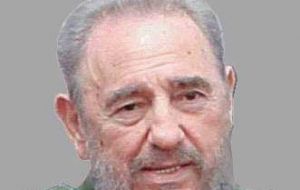MercoPress. South Atlantic News Agency
Fidel playing Cuban musical chair but admires Niemeyer
 Fidel wants to move aside, but where's the new generation?
Fidel wants to move aside, but where's the new generation? With a letter - the contents of which were broadcast on Cuban TV - Fidel Castro, 81, implied that he would be stepping down as leader and would not put obstacles in the path of a younger leader.
The Cuban leader suffering form an illness from which he has not yet recovered placed control of the country in the hands of his brother Raul Castro at the end of July 2006. Since then he has never appeared in public and has been seen episodically in the company of Venezuelan president Hugo Chavez in state-owned TV recordings But despite much excitement this week over one ambiguous sentence in a letter about global warming, Castro already has settled into a kind of reflective semiretirement with Raul, 76, acting as provisional president. But island life has hardly changed under his brother, and the elder Castro has retained his commanding role in Cuban politics with several essays a week and showing up sporadically in official photographs and prerecorded messages. "The succession in power from Fidel Castro to his brother Raul appears to be a done deal, but the evolution away from Fidelismo will start only upon the death of its namesake," wrote Peter DeShazo, a former U.S. State Department official who runs the Americas program at the Center for Strategic & International Studies in Washington. "When that happens, Raul Castro steps out from behind the shadow of his flamboyant sibling and the beginning of a transition process to a new order in Cuba may commence," DeShazo said in a commentary released Tuesday. After the Castro brothers, few younger leaders stand out despite the fact that Fidel has made a priority of nurturing fresh talent to carry on Cuba's communist revolution. Vice President Carlos Lage, 56, is Cuba's de facto prime minister and a strong possibility to be No. 2 if and when Raul Castro permanently assumes the presidency. Foreign Minister Felipe Perez Roque, 42, could be another candidate for vice president or play a key role in the politically powerful Communist Party, which Castro also now heads. The elder Castro has raised the possibility of formally retiring from office before. He declared in an Oct. 20, 2004, speech that if he becomes too sick to lead, he'll call the Communist Party "and tell them I don't feel I'm in condition ... that please, someone take over the command." But despite his intestinal illness, Castro remains the head of government as president of Cuba's Council of State. And he let a clear opportunity to relinquish power pass this month by announcing he'll run again for the National Assembly on Jan. 20. Within weeks after that balloting, the newly formed parliament is expected to select a new Council of State and its president. There has been no official word about Castro's intentions for this process. Cuba's unchallenged leader since 1959, he has held the council presidency since its 1976 creation. "My elemental duty is not to cling to positions, or even less to obstruct the path of younger people, but to share experiences and ideas whose modest worth comes from the exceptional era in which I lived," Castro wrote in the last paragraph of a letter about climate change. But in the next sentence, Castro invoked the example of renowned Brazilian architect Oscar Niemeyer, who is still working at 100, making clear that no matter what title he holds, he will always be busy. "I think like Niemeyer, that you have to be of consequence up to the end," Castro wrote. The statement was so vague that Castro "left himself room to do anything he wants," said Phil Peters, of the pro-democracy Lexington Institute, a Washington area think tank. "He is sort of hinting, teasing."




Top Comments
Disclaimer & comment rulesCommenting for this story is now closed.
If you have a Facebook account, become a fan and comment on our Facebook Page!